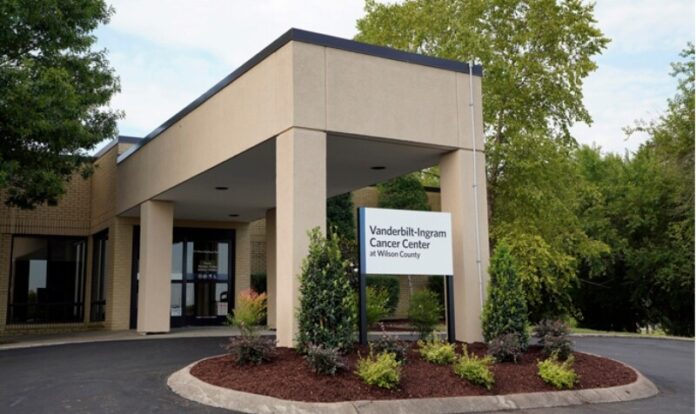When Vanderbilt acquired Tennova Healthcare-Lebanon three years ago, there was a Cancer Center that had been built in the hospital, but never occupied. Just over a year ago a technologically advanced Cancer Center was opened in the shell of the previous structure providing patients in Wilson and adjacent counties an alternative to driving into congested Nashville for treatment. The new center has made cancer treatment for these patients much easier.
“What a blessing,” said one recent patient. “Finished my 39th and final radiation treatment today at Vanderbilt-Ingram Cancer Center-Wilson County…The ability to drive up I-840 to the premier Vanderbilt-Ingram Cancer Center- Wilson County, receive radiation treatment from the newest [ETHOS] radiation equipment in the nation (and one of only ten currently in operation in the world), and park right at the front door of the center was wonderful.”
Vanderbilt University Medical Center acquired the medical center in Lebanon, Tennessee in 2019, re-branding the facility as Vanderbilt Wilson County Hospital (VWCH) as a reflection of the strategic partnership, according to tmpartners.com. Vanderbilt University Medical Center envisioned an updated campus to provide the community and hospital caregivers with a state-of-the-art facility and expanded key services. The existing facility contained a Cancer Center that was constructed in 1996 but never occupied, and this renovation of the old shell into a comprehensive Cancer Center provides a convenient option for patients in this area to receive quality oncology services.
What makes the Cancer Center different is the Varian ETHOS Linear Accelerator. This machine provides key analytics to target patient treatments. The existing twenty-six-year-old vault was repurposed with minimal work to house the new cutting-edge technology. The radiation oncology services also include an area for High Dose Radiation treatments.
Christien Kluwe, M.D., Phd, an Assistant Professor in the Department of Radiation Oncology at Vanderbilt-Ingram Cancer Center, explained on Vanderbilt’s YouTube Channel how the new technology delivers radiation therapy with pinpoint precision based on artificial intelligence. He noted that there are two unique points about the new technology. First, the hardware allows for accelerated treatment. And, second, artificial intelligence is part of the platform.
Previous to the development of this new technology, a cancer patient would come in and get a CT scan so doctors could see the tumor, then over a ten-day period, doctors would look at the scan and collaborate on treatment. Treatments takes place five days a week, Monday through Friday, for five to six weeks. Things can change internally over the treatment period.
“People are not exactly like their scans,” explained Dr. Kluwe. A scan is a capture of the body at one moment in time. Organs move around. So, doctors would have to do some calculation to minimize damage to organs near the tumor.
“With this platform,” noted Dr. Kluwe, “we do a CT scan every day, so we see where the patient is now, and adapt treatment to how they look now.”
The new technology has also cut the ten-day analysis period to about three minutes, it also decreases toxicity because the radiation treatment is adjusted precisely to that day’s scans, causing fewer side effects, and improving patient outcomes. The ETHOS is the future of radiation therapy.
The technology is also making it easier to treat difficult types of cancer, like head and neck cancers. While improving treatment of abdominal cancers like prostate, lower GI, gynecological and pancreatic cancers. It is revolutionizing treatments from head to toe.
Development of this NCI-designated comprehensive Cancer Center was possible through a collaboration between caregivers, facility leadership, designers, builders, and equipment planners. Together they created and executed a vision for use of the existing space and made old new again. The final product for the Vanderbilt Wilson County Hospital Cancer Center resulted in a compact floor plan that provides space for both radiation oncology and medical oncology services.
One of only 51 Comprehensive Cancer Centers designated by the National Cancer Institute (NCI), Vanderbilt-Ingram offers treatment options unique to the region provided by internationally renowned physicians. In addition to its NCI designation, Vanderbilt-Ingram is one of 30 members of the National Comprehensive Care Network focused on multidisciplinary approaches to advance better treatments for complex, aggressive and rare cancers.
Those oncology services are also the product of weekly collaboration. Dr. Kluwe said that every Monday all of the people treating cancer patients – medical oncologists, radiation oncologists, surgeons and various specialists — get together to discuss patient care and treatment. The comprehensive Cancer Center brings nationally recognized cancer care professionals to Wilson County, with the comfort and convenience of receiving care close to home. This expert team includes specialists who are experienced in diagnosing and treating all types of cancer, from common diseases to the most complex cases.
“The toughest thing is how far people have to come to get treatment,” added Dr. Kluwe. With this facility, more people are able to get to a comprehensive Cancer Care Center and receive a coordinated treatment plan under the Vanderbilt collaboration closer to home.
The Vanderbilt-Ingram Cancer Center at Wilson County is located at 1411 West Baddour Parkway, Lebanon, TN.




















